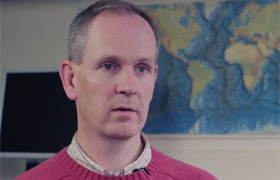Reading scientists warn governments not to ignore landmark climate change report
Release Date 27 September 2013

University of Reading scientists are warning the world's governments not to ignore the findings of the most comprehensive assessment of climate change.
The Fifth Assessment Report from the UN's Intergovernmental Panel on Climate Change (IPCC) is published today at a major conference in Stockholm. The landmark report finds that scientists are 95% sure that the humans are the 'dominant cause' of global warming since the 1950s.
17 of the University of Reading's climate scientists were among hundreds contributing to the report - which was led by 259 authors from 39 countries. It has taken three years to produce.
Professor Rowan Sutton is a lead author. He is the Director of Climate Research in the UK National Centre for Atmospheric Science (NCAS), based in Reading's Department of Meteorology.
On the contribution of Reading's scientists, Professor Sutton said:
"The very substantial roles of Reading scientists in the production of the IPCC report is a direct reflection of the strength and breadth of climate change-related research at the University of Reading. Brought together under the umbrella of the Walker Institute, Reading's Department of Meteorology is a key focus, but many other departments are also making very substantial contributions to climate science."
Watch a video about Reading's role in IPCC >>>
On the report's findings, Professor Sutton said:
"All the evidence makes it clear that leaving the issue of climate change for future generations to deal with is a phenomenally high-risk option.
"The report shows that the evidence of human activities affecting climate is increasingly widespread and stronger than ever.
"The report shows there is a very substantial risk of exceeding 2oC warming, relative to pre-industrial climate, by the end of the century. Only under a very ambitious scenario for reducing greenhouse gas emissions is a warming of more than 2oC considered unlikely.
"This report provides the evidence that governments need to take tough decisions on climate change policy. I hope they will read it carefully and take seriously all its findings.
"An increasing frequency of hot days, and intense rainfall events, are some of the changes that could affect Britain. Working out more of the details is a major focus of our research."
ENDS
For further information or to organise interviews contact Pete Castle at the University of Reading press office on 0118 378 7391.
Notes to editors:
The University of Reading is ranked among the top 1% of universities in the world (THE World University Rankings 2012). Its Department of Meteorology and Walker Institute for Climate System Research makes Reading one of the world's foremost centres for the study of global weather and climate.
For more information on Reading's Walker Institute for Climate System Research: http://www.walker-institute.ac.uk/
